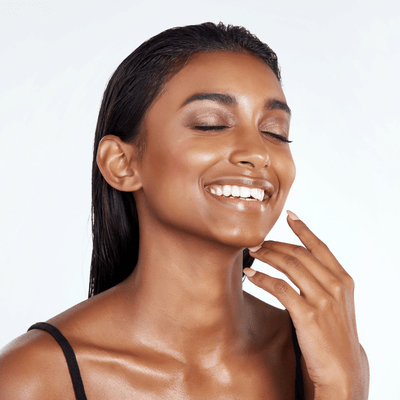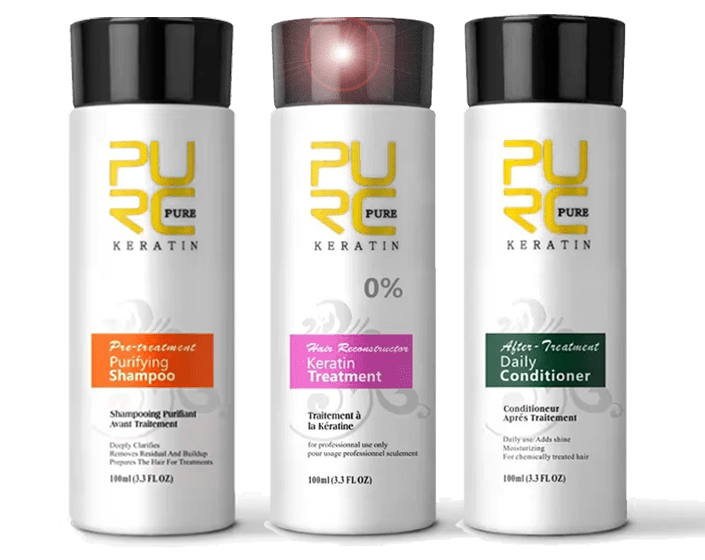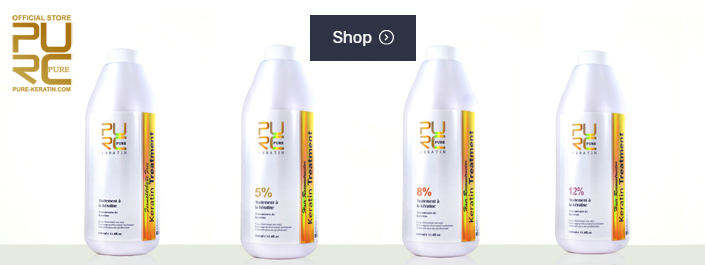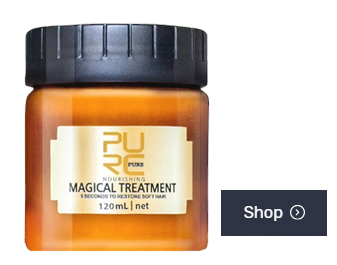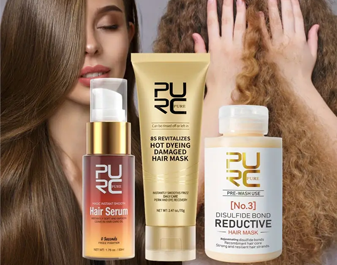Keratin treatment for curly frizzy hair
KERATIN TREATMENT on 18th Jul 2024
Keratin Treatment for Curly Frizzy Hair: Comprehensive Guide and Benefits
Definition of Keratin Treatment
Keratin treatments are salon or at-home procedures designed to smooth and manage frizzy, curly hair by infusing it with keratin, a protective protein found naturally in hair. This treatment temporarily coats the hair with keratin, reducing frizz, adding shine, and making hair more manageable.
Keratin is a fibrous structural protein crucial to the health and strength of hair. It protects hair from damage and stress, but over time, keratin levels can diminish due to exposure to environmental factors and chemical treatments. Keratin treatments replenish this protein, restoring hair's smoothness and strength.
The primary purpose of keratin treatment is to reduce frizz and enhance the smoothness and shine of hair, making it easier to style. It addresses the common challenges faced by individuals with curly, frizzy hair, providing a long-lasting solution that improves hair's overall health and appearance.
Importance for Curly, Frizzy Hair
Managing curly, frizzy hair can be challenging due to its susceptibility to dryness, tangling, and frizz. Keratin treatments offer a significant benefit by providing a protective layer that smooths the hair cuticle, reducing frizz and making hair more manageable and less prone to damage.
Curly, frizzy hair often requires extensive care and maintenance to prevent dryness, breakage, and frizz. Traditional hair care methods may not be sufficient, leading individuals to seek more effective solutions like keratin treatments to achieve desired results.
Keratin treatments offer numerous benefits for curly, frizzy hair, including:
- Frizz Reduction: Smooths the hair cuticle, reducing frizz.
- Enhanced Manageability: Makes styling easier and quicker.
- Improved Shine: Adds a natural, healthy shine to hair.
- Damage Protection: Provides a protective barrier against environmental damage.
- Long-Lasting Results: Effects can last several months with proper care.
Brief History of Keratin Treatments
Keratin treatments have evolved over time, with the Brazilian Keratin Treatment being one of the first to gain popularity. Initially introduced in the early 2000s, these treatments have become a staple in hair care routines worldwide, offering a reliable solution for managing frizzy, curly hair.
The origins of keratin treatments can be traced back to Brazil, where they were developed to combat the effects of humidity on hair. Over the years, the formulations and techniques have evolved, becoming safer and more effective, and gaining widespread acceptance in salons globally.
The popularity of keratin treatments has surged due to their effectiveness and the growing demand for smooth, manageable hair. As formulations have improved and more people have shared their positive experiences, keratin treatments have become a go-to option for individuals seeking a lasting solution to frizzy, curly hair.
Types and Categories of Keratin Treatments
Brazilian Keratin Treatment
The Brazilian Keratin Treatment is one of the most popular types, known for its intensive smoothing effects and long-lasting results.
Features and Benefits
- Deep Conditioning: Provides intense moisture and hydration.
- Long-Lasting: Results can last up to six months with proper care.
- Versatile: Suitable for all hair types, including colored and chemically treated hair.
Application Process
- Preparation: Hair is washed with a clarifying shampoo to remove buildup.
- Application: Keratin solution is applied to damp hair and left to penetrate.
- Heat Activation: Hair is blow-dried and flat-ironed to seal the keratin.
- Post-Treatment Care: Avoid washing or tying hair for 72 hours to allow the treatment to set.
Japanese Keratin Treatment
Japanese Keratin Treatment combines the benefits of traditional keratin treatments with the permanent straightening effects of Japanese hair straightening.
Features and Benefits
- Permanently Straightens: Provides long-term straightening and smoothness.
- Damage Repair: Repairs and strengthens damaged hair.
- Low Maintenance: Reduces the need for daily styling.
Application Process
- Consultation: Hair is assessed for suitability.
- Application: A keratin solution is applied and left to process.
- Heat Treatment: Hair is straightened using a flat iron.
- Neutralization: A neutralizing solution is applied to lock in the results.
Soft Keratin Treatment
Soft Keratin Treatment is a gentler option suitable for those seeking smoother hair without altering their natural texture.
Features and Benefits
- Gentle Formula: Suitable for sensitive or damaged hair.
- Natural Texture: Enhances natural curls and waves while reducing frizz.
- Shorter Duration: Typically lasts 6-8 weeks.
Application Process
- Preparation: Hair is cleansed with a gentle shampoo.
- Application: Soft keratin solution is applied and combed through.
- Heat Activation: Hair is blow-dried and lightly flat-ironed.
- Post-Treatment Care: Use sulfate-free products to maintain results.
Express Keratin Treatment
Express Keratin Treatment offers a quicker, more affordable option for those looking for temporary smoothness and frizz reduction.
Features and Benefits
- Quick Application: Takes less time than traditional treatments.
- Temporary Results: Lasts 4-6 weeks, ideal for special occasions.
- Cost-Effective: More affordable than other keratin treatments.
Application Process
- Preparation: Hair is washed with a clarifying shampoo.
- Application: Express keratin solution is applied and left to process.
- Heat Activation: Hair is blow-dried and flat-ironed.
- Post-Treatment Care: Follow-up with sulfate-free products.
At-Home Keratin Treatment Kits
At-home keratin treatment kits provide a convenient alternative for those who prefer to perform the treatment themselves.
Features and Benefits
- Convenience: Perform the treatment at home at your own pace.
- Cost Savings: More affordable than salon treatments.
- Variety: Various formulations available for different hair types and needs.
Application Process
- Preparation: Follow the kit instructions for washing and prepping hair.
- Application: Apply the keratin solution as directed.
- Heat Activation: Blow-dry and flat-iron hair to seal the keratin.
- Post-Treatment Care: Adhere to aftercare instructions for best results.
Comparison of Salon and At-Home Treatments
Both salon and at-home keratin treatments offer benefits and drawbacks, depending on individual needs and preferences.
Salon Treatments
- Professional Application: Ensures consistent and high-quality results.
- Longer-Lasting: Typically lasts longer due to the professional-grade products used.
- Higher Cost: Generally more expensive due to the service and product quality.
At-Home Treatments
- Convenient: Can be done at home at a time that suits you.
- Cost-Effective: More affordable than salon treatments.
- Varied Results: May not last as long or be as consistent as salon treatments.
Symptoms and Signs
Indications for Needing Keratin Treatment
Keratin treatments are beneficial for individuals experiencing specific hair issues.
Signs of Damaged Hair
- Dryness and Brittle Texture: Hair lacks moisture and breaks easily.
- Split Ends: Visible signs of hair damage and fraying.
- Dullness: Lack of shine and vibrancy.
Frizz and Curl Management
- Unmanageable Frizz: Persistent frizz despite using anti-frizz products.
- Difficult-to-Style Curls: Curly hair that is hard to manage and style.
Common Results Post-Treatment
Post-treatment results vary but generally include smoother, shinier, and more manageable hair.
Hair Texture and Smoothness
- Smoother Hair: Reduced frizz and enhanced smoothness.
- Improved Texture: Softer and more manageable hair.
Longevity of Results
- Duration: Results typically last 3-6 months, depending on hair care routines.
- Maintenance: Proper aftercare extends the treatment's longevity.
Potential Side Effects
Keratin treatments, while beneficial, can have side effects.
Allergic Reactions
- Skin Irritation: Redness, itching, or swelling at the application site.
- Respiratory Issues: Breathing difficulties due to formaldehyde fumes in some treatments.
Hair Breakage
- Over-Processing: Excessive use of heat and chemicals can weaken hair.
- Post-Treatment Care: Importance of following proper aftercare guidelines.
Causes and Risk Factors
Biological Factors
Biological factors significantly influence the condition of hair and its response to treatments.
Genetics and Hair Type
- Inherited Traits: Natural curl pattern and hair texture.
- Ethnic Background: Different hair care needs based on ethnic hair types.
Age and Hormonal Changes
- Aging Hair: Changes in hair texture and thickness with age.
- Hormonal Influences: Effects of hormones on hair growth and health.
Environmental Factors
Environmental factors play a crucial role in hair health and the need for treatments.
Climate and Weather Conditions
- Humidity: Increased frizz in humid climates.
- Seasonal Changes: Effects of weather changes on hair texture.
Exposure to Chemicals
- Pollution: Damage from pollutants and environmental toxins.
- Chemical Treatments: Impact of coloring, bleaching, and other chemical processes.
Lifestyle Factors
Daily habits and routines can affect hair health and the effectiveness of treatments.
Hair Care Routines
- Washing Frequency: Over-washing or under-washing effects.
- Product Use: Importance of using suitable hair care products.
Use of Styling Tools
- Heat Damage: Effects of frequent use of blow dryers, flat irons, and curling irons.
- Mechanical Damage: Breakage from tight hairstyles and improper brushing.
Diagnosis and Tests
Consultation with a Hair Professional
A professional consultation is essential for assessing hair health and determining the appropriate treatment.
Assessing Hair Health
- Hair Analysis: Examining hair texture, thickness, and damage level.
- Scalp Condition: Checking for scalp issues that might affect treatment suitability.
Determining Suitability for Treatment
- Hair History: Reviewing previous treatments and chemical processes.
- Treatment Goals: Understanding the desired outcomes and setting realistic expectations.
Patch Tests for Allergies
Patch tests help identify potential allergic reactions to treatment ingredients.
Importance of Pre-Treatment Testing
- Safety Precaution: Preventing severe allergic reactions.
- Product Suitability: Ensuring the product is safe for individual use.
How Patch Tests are Conducted
- Application: A small amount of product is applied to a discreet area of the skin.
- Observation: Monitoring for any adverse reactions over 24-48 hours.
- Evaluation: Proceeding with the treatment if no reactions occur.
Treatment Options
Salon-Based Keratin Treatments
Professional salon treatments offer a reliable and effective option for achieving smooth, frizz-free hair.
Process and Expectations
- Preparation: Hair is thoroughly cleansed to remove impurities.
- Application: Keratin solution is applied and evenly distributed.
- Heat Activation: Hair is blow-dried and flat-ironed to seal in the keratin.
- Post-Treatment Care: Instructions for maintaining results, including avoiding washing or tying hair for a specified period.
Cost and Time Investment
- Cost: Varies based on salon and treatment type, typically ranging from $200 to $500.
- Time: Treatment duration can be 2-4 hours, depending on hair length and thickness.
DIY At-Home Treatments
At-home keratin treatment kits provide a more accessible and affordable option for hair smoothing.
Instructions and Precautions
- Preparation: Wash hair with a clarifying shampoo.
- Application: Apply the keratin solution according to the kit instructions.
- Heat Activation: Blow-dry and flat-iron hair to seal the treatment.
- Aftercare: Use sulfate-free products and follow maintenance guidelines.
Choosing the Right Product
- Research: Read reviews and select reputable brands.
- Hair Type Consideration: Choose products suited to specific hair types and needs.
Preventive Measures
Maintaining Healthy Hair
Adopting a consistent hair care routine is essential for maintaining healthy, smooth hair post-treatment.
Regular Trims
- Preventing Split Ends: Regular trims prevent split ends from progressing up the hair shaft.
- Maintaining Shape: Keeps hair looking neat and healthy.
Hydration and Moisture
- Deep Conditioning: Regular deep conditioning treatments to maintain moisture levels.
- Hydrating Products: Use shampoos and conditioners designed for hydration.
Protective Styling
Protective styling helps reduce damage and maintain the benefits of keratin treatments.
Low Manipulation Hairstyles
- Buns and Braids: Styles that reduce daily manipulation and stress on hair.
- Loose Styles: Avoiding tight hairstyles that cause breakage.
Nighttime Care
- Silk or Satin Pillowcases: Reduce friction and prevent breakage.
- Protective Wrapping: Using scarves or bonnets to protect hair while sleeping.
Personal Stories or Case Studies
Real-Life Transformations
Sharing personal stories and experiences with keratin treatments can provide insight and inspiration for those considering the treatment.
Before and After Experiences
- Case Study 1: Transformation of a woman with severely frizzy hair to smooth, manageable hair.
- Case Study 2: A curly-haired individual achieving defined curls and reduced frizz post-treatment.
Testimonials
- User Reviews: Positive feedback from individuals who have undergone keratin treatments.
- Expert Endorsements: Recommendations from hair professionals.
Challenges and Success Stories
Understanding the challenges and successes experienced by others can help set realistic expectations and provide valuable tips.
Overcoming Initial Concerns
- Fear of Damage: How individuals addressed concerns about potential damage.
- Cost Considerations: Managing the financial aspect of keratin treatments.
Achieving Desired Results
- Consistency: Importance of following aftercare instructions for best results.
- Maintenance: Tips for maintaining the benefits of the treatment over time.
Expert Insights
Hair Care Professionals
Expert insights from hair care professionals provide valuable information on keratin treatments and hair health.
Top Stylists' Recommendations
- Product Recommendations: Endorsements of specific keratin treatment brands and products.
- Application Tips: Professional tips for achieving the best results from keratin treatments.
Salon Owner Perspectives
- Trends in Treatments: Insights into the latest trends and advancements in keratin treatments.
- Customer Feedback: Common feedback and experiences shared by salon clients.
Scientific Research
Scientific research provides a deeper understanding of the effectiveness and safety of keratin treatments.
Studies on Keratin Treatment Efficacy
- Clinical Trials: Results from studies evaluating the effectiveness of keratin treatments.
- Long-Term Effects: Research on the long-term benefits and potential risks of keratin treatments.
Health and Safety Considerations
- Formaldehyde Concerns: Addressing the presence of formaldehyde in some keratin treatments.
- Safe Alternatives: Exploring formaldehyde-free options and their effectiveness.
Conclusion
Keratin treatments offer a transformative solution for individuals with curly, frizzy hair, providing smoother, shinier, and more manageable hair. Understanding the different types of treatments, their benefits, application processes, and potential side effects is essential for making an informed decision.
By considering factors such as hair type, treatment goals, and maintenance routines, individuals can choose the most suitable keratin treatment and enjoy the lasting benefits of smoother, healthier hair.
For those interested in keratin treatments, consulting with a hair care professional and following expert advice is crucial for achieving the best results and maintaining hair health.
Embrace the journey to beautiful, manageable hair with the right keratin treatment, and enjoy the confidence and ease that comes with smooth, frizz-free locks.














